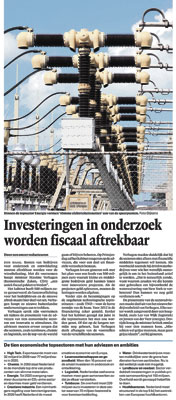The Dutch minister of Econonmic Affairs and Innovation, Maxime Verhagen, has presented the outline of his new research funding for top economic sectors. Most professors reacted positively.
The 18 June edition of the Dutch newspaper NRC Handelsblad explained that according to Verhagen’s proposal, investments in research will be made tax-deductible for businesses, with a yearly national maximum of 500 million euros. Secondly, an equal sum will be reserved as an innovation credit fund. Credits are to be repaid with returns on investment. No cure, no pay.
“Selecting top sectors assumes a rationality in choices that doesn’t exist,” says Professor Alfred Kleinknecht (TPM). “How can ‘The Hague’ know which sectors will be the fastest horses? They don’t. Instead, they chose to support the established industry. Outsiders and basement innovators get passed by.”
Verhagens ten ‘top sectors’ cover most of the Netherlands’ major industries, including energy, water, chemistry and infrastructure. Not surprising then those professors from these sectors reacted quite positively to Verhagen’s proposal. “It’s a good thing that water-related research continues to be supported,” says drinking water expert, Professor Hans van Dijk (CEG). “Water has righteously been a vanguard for years because of the Dutch reputation and knowledge in this area.”
Harbour specialist, Professor Tiedo Vellinga (CEG), thinks that making research investments tax-deductible will make it easier for industry and commerce to invest in research. But, he says, researchers must take the initiative and approach business partners. Electrical power expert, Professor Lou van der Sluis, is also positive about the proposal, but he points out that at the same time smaller research funds from Agency NL have been terminated. Prof. Kleinknecht: “Fiscal deduction for R&D spending is in principle a good choice. No economist would counter that.”
The other measure, the 500 million credit facility, is a good idea as well, Prof. Kleinknecht believes, reminding him of a technical development credit implemented in 1953, “which functioned very well for a long time until some moron discarded it some 15-20 years ago.”
According to Prof. Vellinga, the TU can benefit from the credit facility as long as it is actively setting up projects with trade and industry. “Working with industry is getting more and more important,” adds Prof. Van Dijk. “We’ve been doing that for years, so I don’t expect big changes.”
Prof. Kleinknecht does however see a counter-plea: “The existing tendency toward applied research at the expense of fundamental research is getting stronger. In the short term the returns will be more, but less in the long term.” He also signals the danger that the TU will hire itself out as a consultancy bureau, “making itself obsolete in the long run.”
Rector Magnificus, Professor Karel Luyben, says the university should “keep its back straight” and not do small jobs for industry. Projects should be six months minimum. But he admits that his personal views have not (yet) been translated into an ethical code. He also admits it will be hard for cash-strapped sections to refuse money from industry. Rector Luyben knows that some sections can hardly pay their staff since contract funding has declined.
“Our aim is not to make money,” Rector Luyben says suddenly, “but to spend it. Of course we should do so wisely, accountably and with results. But spending is what we’re here for.”
‘If I were a rich man’ draaide dit orgel er bij de opening van het collegejaar op los. De vakbonden vroegen daarmee aandacht voor de stukgelopen cao-onderhandelingen. De bonden willen een salarisverhoging van 1,25 procent om koopkracht te behouden, maar de VSNU zegt daarvoor geen geld te hebben.



Comments are closed.